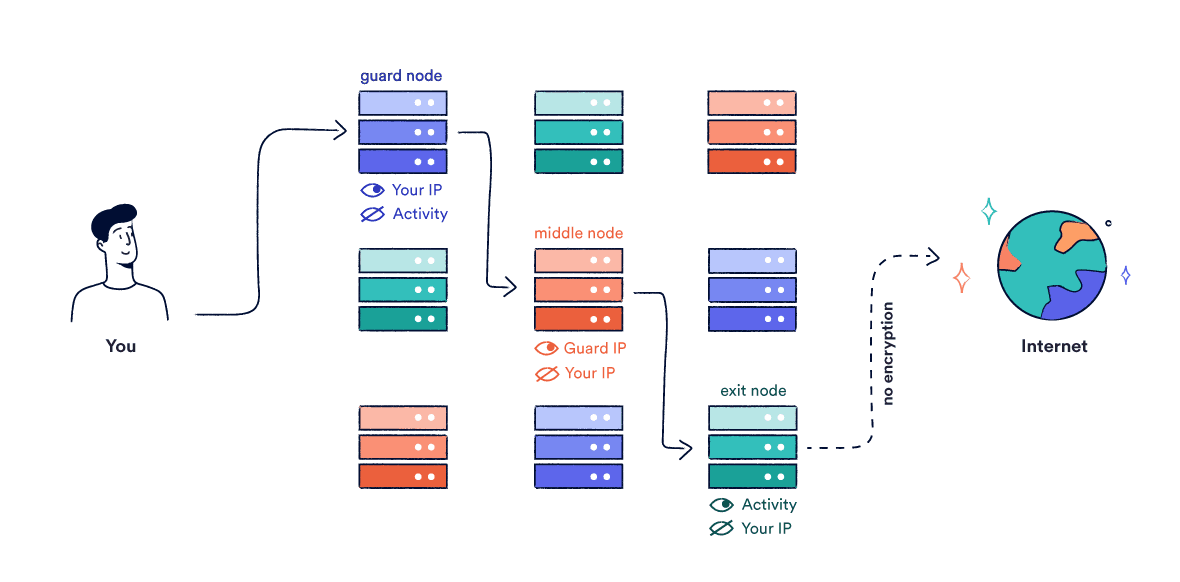VPNs and Tor are completely different types of software that work independently of each other to encrypt your web traffic and hide your IP address.
It’s possible to use Tor without a VPN and still remain anonymous, and it’s not always beneficial to use both at the same time – especially if you connect to them in the wrong order.
However, in most circumstances, it’s wise to use a combination of the two technologies for maximum privacy. VPNs typically come with additional security features like a kill switch, and they can be useful for gaining access to Tor in highly-censored countries.
Before we explain exactly how and why it can be beneficial to use a VPN with Tor, we’ll need to explain how the Tor Network actually works, and the different ways you can combine the two technologies.
Onion Over VPN vs. VPN Over Tor
When you use the Tor Browser, your web traffic is encrypted and routed through a random network of servers or ‘nodes’. Each node in the chain only knows the identity of the node directly next to it.

How your data passes through the Tor network.
Importantly, the first node in the sequence (the ‘guard’ node) can see your true IP address, but not the contents of your traffic. The last node in the sequence (the ‘exit’ node) can see your traffic, but not your IP address.
This information plays a key role in differentiating the two ways you can combine a VPN with Tor, which we’ll explain now.
1. Onion Over VPN
If you connect to a VPN and then use the Tor Browser, it’s known as Onion over VPN. Here, your data is routed through the VPN’s server before it reaches Tor, which means your ISP is unable to see that you’re using the Tor Network.
This method also hides your real IP address from the Tor guard node, and hides your internet activity (while using Tor) from your VPN service. However, it does not hide your activity from Tor’s Exit node.
Your VPN provider will know you’re using Tor, but it won’t be able to see what you’re doing.
Onion over VPN is the simplest way to set up a VPN with Tor, and it’s the most popular method of combining the two.
2. VPN Over Tor
If you route your traffic through Tor and then connect to a VPN service, it’s known as VPN over Tor.
In this scenario, all your VPN traffic also travels through the Tor network. Exit nodes are unable to see your activity, but the first node in the Tor network will be able to see your real IP address.
More importantly, your ISP will be able to see that you’re using Tor (though it won’t see what you’re doing), and your VPN will technically be able to see your activity.
Which Method Should You Use?
As you can see, the advantages of using a VPN with Tor depend on how you’re using it and what you’re trying to achieve.
Using Tor can invite unwanted attention from your ISP, so we generally recommend using Onion over VPN to hide your activity from your ISP. This method is easier to set up, much faster than VPN over Tor, and provides a larger privacy benefit.
However, you can technically use VPN over Tor if you’re particularly concerned about malicious exit nodes spying on your activity.
EXPERT ADVICE: We recommend avoiding the ‘Onion over VPN’ servers offered by some VPN services. These allow you to connect to .onion websites using traditional browsers like Chrome or Firefox, which are far less secure than Tor itself. If you’re going to use a VPN with Tor, connect to a normal VPN server and then access the Tor Browser.
The Downsides of Using a VPN with Tor
Despite the potential benefits, it’s possible to actually decrease your anonymity by using a VPN and Tor at the same time.
VPNs that don’t offer cash or cryptocurrency payments can leave a money trail. Some low-quality VPNs even record your IP address, activity logs, and timestamps – making it much easier to identify a user’s online behavior.
Put simply, a VPN adds another layer of responsibility to your web traffic. If you entrust that responsibility to an insecure or dangerous VPN, you may be worse off than not using one at all.
In many cases, using the two together can also be overkill. You’ll experience very slow connection speeds, and the extra layer of encryption doesn’t offer any additional security.
As a general rule, you should only use VPN and Tor together in extreme circumstances where you require complete anonymity. For casual use or day-to-day privacy, use a VPN by itself.
If you do use the two together, we advise you use a strictly no-log VPN in combination with anti-malware software to stay safe.

























